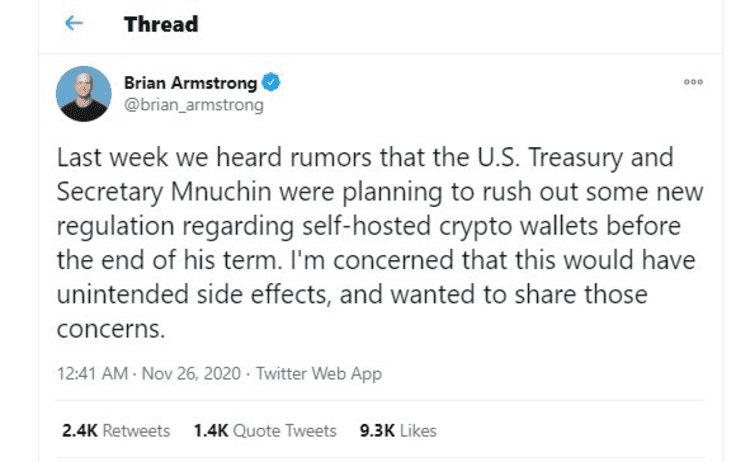Is the US Treasury Trying to Backstab Crypto?

End of November Brian Armstrong, Co-founder & CEO at Coinbase, took to Twitter to address the rumor that the U.S. Treasury and Secretary Mnuchin were planning to rush out regulation regarding self-hosted crypto wallets. It lets individuals store and use their cryptocurrency, instead of needing to rely on a third party financial institution like an exchange. That this is more than a rumor is becoming clearer. Recently, Coindesk placed an article about this very issue, claiming that FinCEN is recruiting two crypto policy advisors to address this very issue.

But let me start with why I am devoting this article to this very rumor. I am doing a PhD at the Law Faculty of VU University in Amsterdam, researching public blockchain governance. In my view, governance is a crucial component to understand blockchain and crypto and helps to promote its further adaptation. During a meeting this week with my promotor Professor Arno Lodder and co-promotor Dr Tina van der Linden, we spoke in depth about governance in technology, which is often not between people, but can be between computers and, say, smart contracts, for instance. That “no human interaction component”, the trustless trust, is precisely where U.S. Treasury and Secretary Mnuchin fail to connect the dots and appreciate what drives a lot of people to crypto, namely the core principle of blockchain: decentralization.
The way the decentralized blockchain works is by default eliminating the middleman or intermediates, and avoiding if not eliminating any single point of failure. This creates an open environment, making connections and transactions between two parties, the peer to peer concept, come to live. It drives and stimulates innovation as it takes away the reliance on third parties, or a server being down. Actually it takes away borders, literally even. Blockchain technology directly connects parties from all over the world. By taking away those barriers we can now see a level playing field forming. Now add the financial industry in the mix, and DeFi is born. That could very well be the beginning of a ‘bye bye’ to banks. I realize that sounds scary if you are Treasurer.
In going forward banks and the financial sector shouldn’t be mollycoddled and protected, they should be invited, persuaded, incentivized, pushed to embrace this opportunity. Not to be used to continue the current way of doing business, but to embrace this brave new empowered world. You have been saying for years you are customer centric. Well, let me tell you something: now you really can. This is the perfect time and opportunity to put your money where your mouth is. Personally a good start would be to allow crypto companies to open a bank account. Why does that have to be a problem? A Treasurer could give a nudge. Even a symbolic one can have a great effect.
But, let’s go back to the issue of why so many people embrace crypto and blockchain. Crypto and blockchain isn’t exclusively about snazzy technology. It is about our deep rooted, intrinsic wish at a very basic human level for decentralization: to be free, to be empowered, to be in control, to be able to avoid third parties. That you are expected to relinquish control because you have to, simply in order to use a certain financial service — just check any terms and conditions clause — is bizarre, and should be a thing of the past. Banks expect us to trust them: but shouldn’t that trust be reciprocated first?
In the crypto community a deep rooted belief — a mantra even — is that you need to be in control of your own wallet: “Not your keys, not your coins”! Trust, or better said the lack thereof, is the issue of our lifetime. We see that failure of trust in virtually every sector of our society, be it towards religion, our politicians, our judicial system, our financial system, science or our media. Fake news anyone?
Let’s zoom in on trust a little further. Governance is a key component in understanding the what and why. Whether it is a corporation, a country’s government or an institution, governance is at the core of what that entity is and aims to be. Technology is no exception to that. Yes, blockchain is a technology that facilitates transparency, traceability of information, immutability of data, equal access but all that does is generate trust. Trust, be it interpreted as fairness, be it as reliability, is precisely what governance is and should be all about. So, bullying is not the solution, but work on the trust issue.
Innovation is crucial for any economy, and especially now seeing all the economic challenges we face for instance due to trade wars, Brexit, COVID-19 just to name a few. Central Banks worldwide are pumping trillions into the economy to keep the wheels of the economy greased, but ultimately we need to step to the plate ourselves and build and reshape the economy. By now, trying to restrict crypto holders with their own wallet, you are seriously hampering empowerment, innovation, and future growth. And that Secretary Mnuchin should be the precise opposite of what you are supposed to do.
This article was first posted on Medium
About the author:
Hans Koning is the Chairman of the DigiByte Foundation. He has been in the forefront of nascent and emerging technologies for over 25 years. Either as an advisor, investor, mentor, coach, lecturer, or simply as an observer, ever since the birth of the internet, he has been committed to guide new technologies in finding its way into society. The goal of the DigiByte Foundation is to protect and promote the true principles of decentralization, and empower DigiByte and its community to further establish and maintain a sustainable decentralized world.
Image by Marketwatch